
[ad_1]

Peter Amstein, a volunteer who serves as president of the Connections Museum board, says early telephone know-how formed his IT profession.
L. Tremaine
cover caption
toggle caption
L. Tremaine
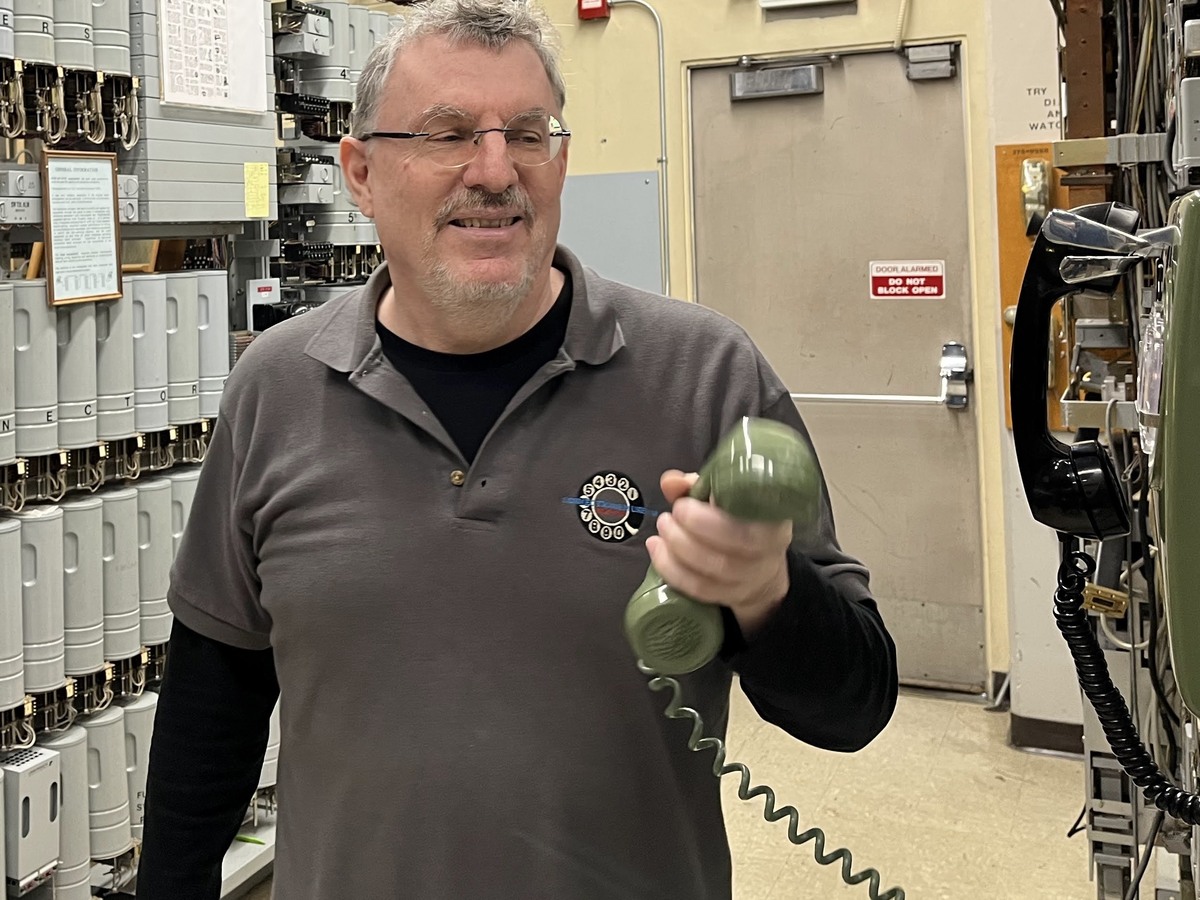
Peter Amstein, a volunteer who serves as president of the Connections Museum board, says early telephone know-how formed his IT profession.
L. Tremaine
As Peter Amstein squeezes via a warren of kit racks draped with wire and filled with whirring machines, he gives a cheerful warning.
“There are exposed electrical terminals, probably nothing will kill you,” he says. “But there are definitely some things that will give you a fairly unpleasant zap, so do be a little cautious about what you touch.”
Amstein works in Seattle’s tech business, however in his spare time he is a lead volunteer, tour information and board president of the group that runs the Connections Museum.
This is a spot the place self-described know-how nerds reminiscent of Amstein are preserving and restoring machines that ran America’s first landline phone community.
It’s a Willy Wonka’s manufacturing facility of clattering gizmos, many invented by steam age eccentrics and tinkerers who managed to attach a complete world.
“This is a high tech startup story, only it’s 120 years old now,” Amstein says.

In the age earlier than computer systems and plastics, America communicated utilizing steam age know-how and networking programs labored out by tinkerers.
L. Tremaine
cover caption
toggle caption
L. Tremaine
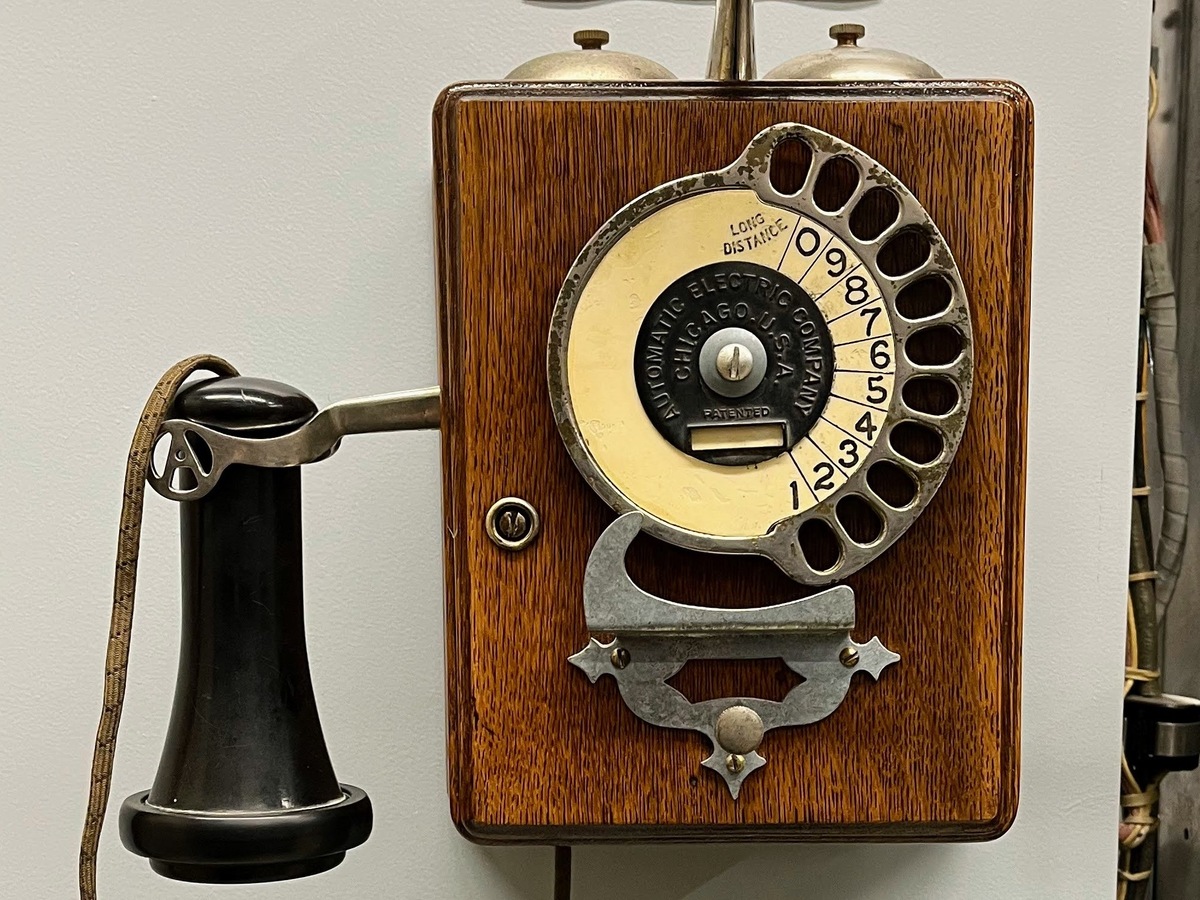
In the age earlier than computer systems and plastics, America communicated utilizing steam age know-how and networking programs labored out by tinkerers.
L. Tremaine
These days Americans usually connect with different people via machines and computer systems, every thing from texting to courting apps to Zoom.
It’s simple to neglect how we obtained right here, how the telephone system shaped our first social community and the way its design nonetheless shapes how we discuss at the moment.
“So much of the stuff that I built my whole [tech] career on comes out of the telephone system, out of the early developments,” Amstein says.
A voice on a wire, a community connecting a world

A customer on the Connections Museum works the type of switchboard system that first related American telephone customers.
Brian Mann/NPR
cover caption
toggle caption
Brian Mann/NPR

A customer on the Connections Museum works the type of switchboard system that first related American telephone customers.
Brian Mann/NPR
Starting within the 1870s, a gaggle of inventors together with Alexander Graham Bell found out methods to translate human voices into electrical alerts and shoot them throughout wires.
It seems that was kind of the simple half. Once you determine methods to assist individuals discuss over lengthy distances, you need to provide you with a community that may hyperlink a globe of chatterboxes.
The first step was human operators, often ladies, who served kind of as the primary software program operating the system.
“Should I gender stereotype you and ask you to be the telephone operator?” Amstein says, inviting a lady customer to take a seat on the museum’s vintage switchboard.
Once she’s prepared, he coaches her methods to make connections one cable at a time. “Number please?” she asks, plugging within the cable and inflicting the telephone to ring promptly.

Public pay telephones labored on a musical chime system that allowed operators to inform whether or not you had paid sufficient cash to make your name.
L. Tremaine
cover caption
toggle caption
L. Tremaine

Public pay telephones labored on a musical chime system that allowed operators to inform whether or not you had paid sufficient cash to make your name.
L. Tremaine
At first, the know-how permitting ladies to run the community was improvised from stuff inventors discovered mendacity round, usually so simple as musical chimes or bells.
For the primary era of payphones, for instance, ladies operators listened to musical notes rung by different-sized cash as they have been dropped into the slot.
“She could hear it,” Amstein says. “The microphone was here [in the phone box], and she could hear the sound of the bells.”
Clever however tremendous sluggish. Not sensible if you wish to join hundreds, then lots of of hundreds of individuals.
Tinkerers discover methods to automate a rising system
Inventors then began arising with steam age machines that would additionally hear and make connections a lot quicker.
Amstein demonstrates one of many earliest, most sturdy gadgets, referred to as a Strowger change, invented within the late 1800s by an undertaker in Kansas City, Mo. “When I pick up the phone here, one of these machines springs into action,” he says.
The gadget whirrs to life, sounding kind of like a drummer tapping out a beat on a cymbal. As Amstein dials a rotary telephone, the Strowger change registers little blips of sound, counts them and makes connections with wonderful accuracy.

This restored model of the Strowger change within the Connection Museum assortment was manufactured by Western Electric. The gadget relied on pulses from rotary dial telephones to determine what connections to make.
L. Tremaine
cover caption
toggle caption
L. Tremaine

This restored model of the Strowger change within the Connection Museum assortment was manufactured by Western Electric. The gadget relied on pulses from rotary dial telephones to determine what connections to make.
L. Tremaine
Designs for automated switches obtained quicker and have become extra dependable, connecting America for greater than a century. Then within the late Nineteen Nineties, computer systems got here in and machines like this have been junked nearly in a single day.
“It’s a beautiful machine”
Amstein exhibits off one of many prizes of the museum’s assortment, a panel change system that fills complete corridors of kit racks.
“This is the last of its kind anywhere, the only working panel switch anywhere on the planet,” he says.
Picture big looms with cables shuttling up and down linking telephone traces.
They discovered this machine mothballed and deserted in a telephone firm storage room. One of the volunteers, Sarah Autumn, spent months splicing it again collectively once more.
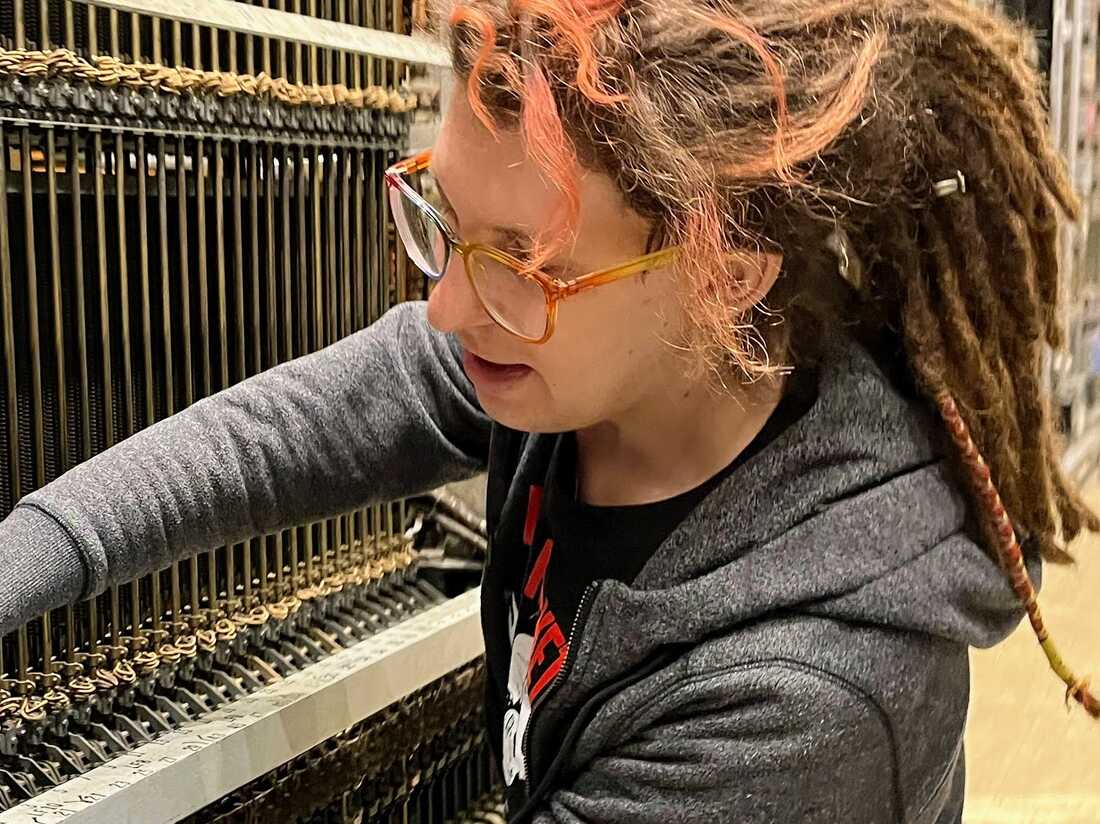
Sarah Autumn, a volunteer on the Connections Museum, helped restore the advanced panel change telephone system, the final of its form operational on the earth. The work took her greater than a yr.
L. Tremaine
cover caption
toggle caption
L. Tremaine
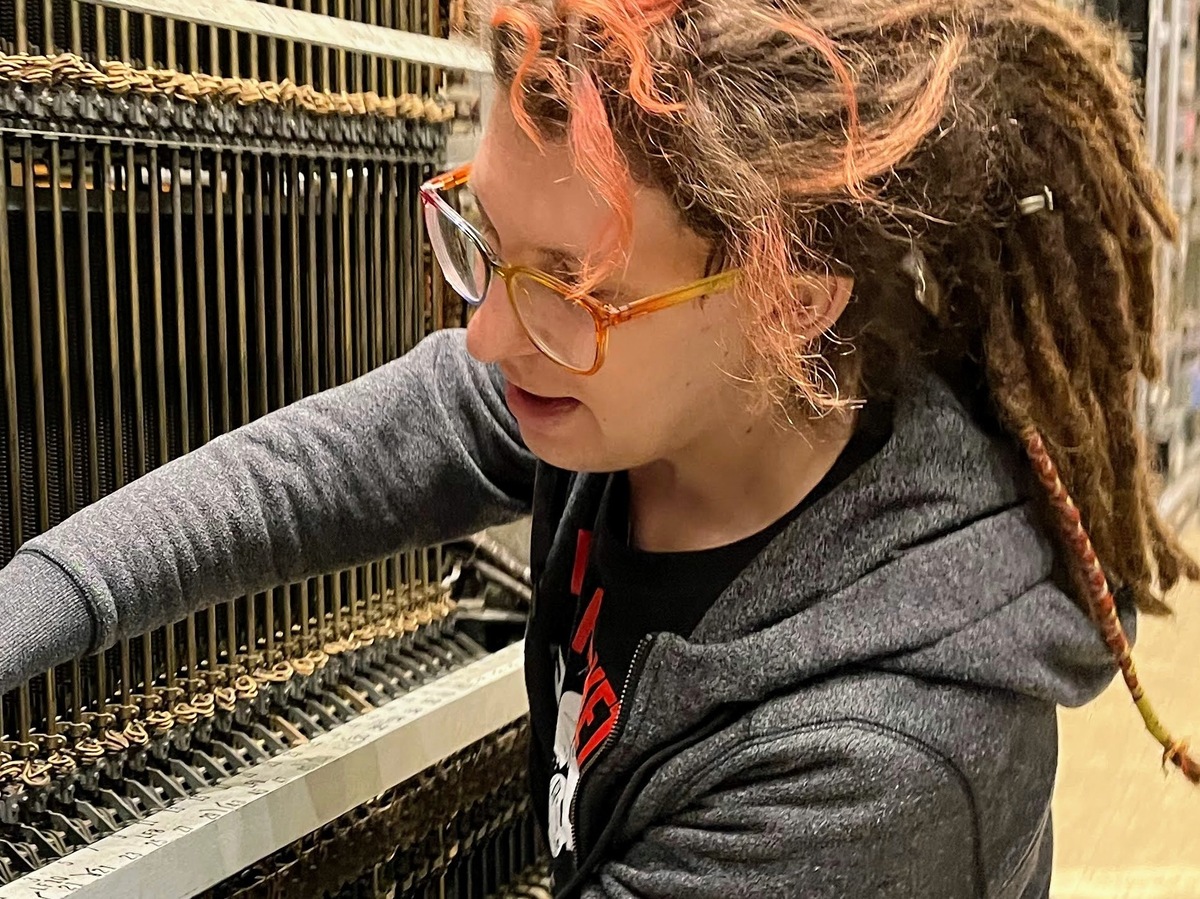
Sarah Autumn, a volunteer on the Connections Museum, helped restore the advanced panel change telephone system, the final of its form operational on the earth. The work took her greater than a yr.
L. Tremaine
“It wasn’t easy,” she says. “It took me about a year just poking at it before I could even begin to understand it in any real depth.”
Like Amstein, Autumn works in Seattle’s tech business.
Asked why she spent lots of of hours of her spare time bringing this gadget again to life, she talks about it not like a damaged equipment, however like a murals.
“I fell in love with it because it’s a beautiful machine,” Autumn says. “Folks who worked on these systems were highly skilled and highly trained at understanding this complex web of interrelationships.”
The individuals working right here say there’s swish engineering woven into a variety of these machines, essential concepts that have been nearly misplaced.
The know-how feels historical. But within the rumble and clatter of those previous machines, you’ll be able to glimpse a chunk of how America obtained to the place we at the moment are — an age of good telephones, TikTok and AI.
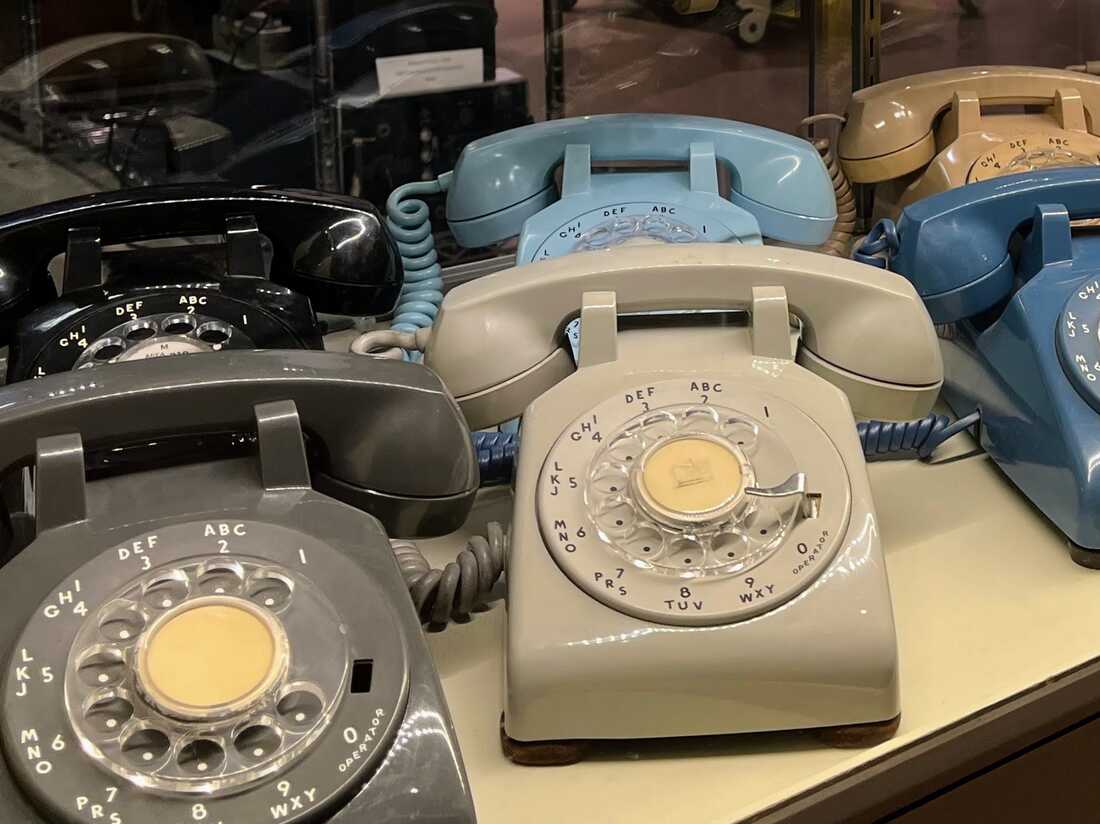
Rotary dial telephones, invented by an undertaker in Kansas City, Mo., within the late 1800s, have been customary know-how within the U.S. for greater than a century.
L. Tremaine
cover caption
toggle caption
L. Tremaine

Rotary dial telephones, invented by an undertaker in Kansas City, Mo., within the late 1800s, have been customary know-how within the U.S. for greater than a century.
L. Tremaine
[adinserter block=”4″]
[ad_2]
Source link